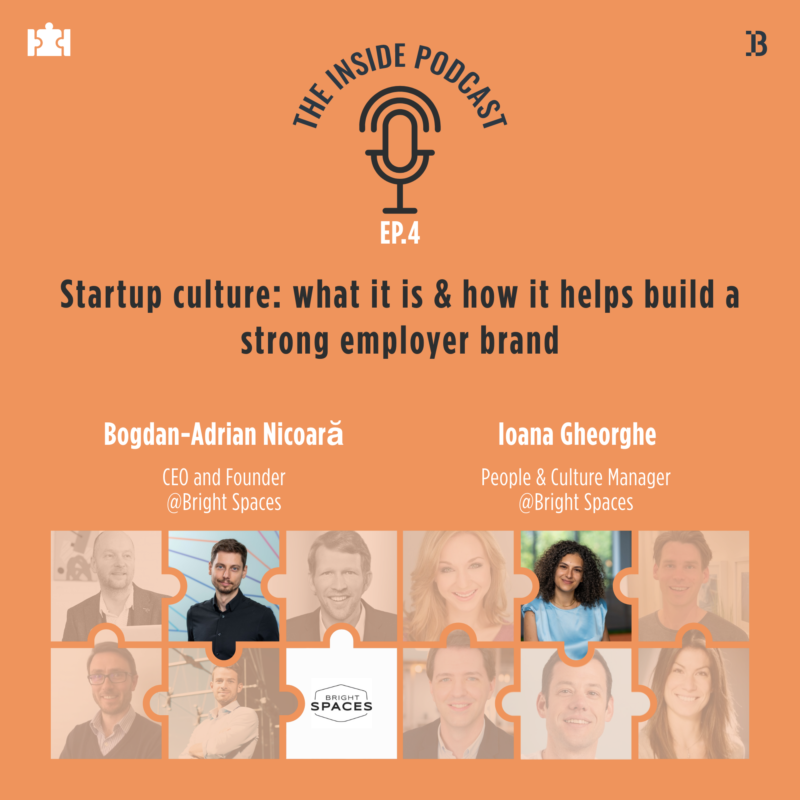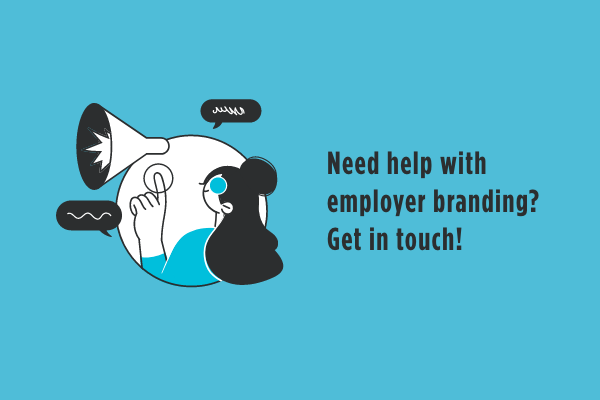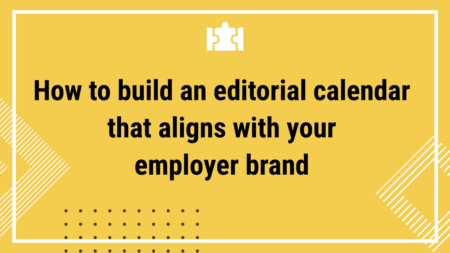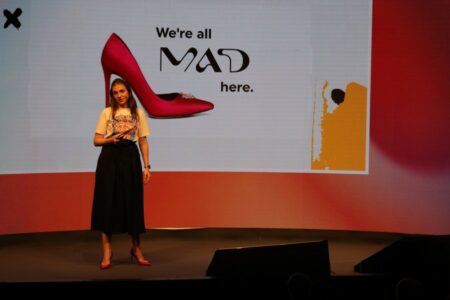Overview
Tune in for Ep.4 of Employer Branding: The Inside Podcast, Season 4!
This time around, we spoke with Bogdan-Adrian Nicoară, CEO & Founder, and Ioana Gheorghe, People & Culture Manager at Bright Spaces, the end-to-end digital leasing solution for commercial real estate.
We talked about startup culture and leadership best practice, but also about the importance of adaptability in a hybrid work environment, recruitment marketing in 2022, and the role of transparency in building a strong employer branding.
What you’ll learn by listening
- Company culture & leadership best practices
- Tips for building your employer brand from the ground up
- An overview of a company’s growth potential & its impact on candidate perception
- Implementing a proper ESG company policy
- How does the workplace reflect the culture of a company
- Adaptability – the key to success in a hybrid work environment
- Recruitment marketing in 2022: employer branding takes the lead
- Transparency in employer branding
About the company
Bright Spaces is the end-to-end digital leasing solution for commercial real estate. We are enhancing the showcasing, inventory & lead management, reporting, and communication between landlords, brokers, and tenants.
The idea of Bright Spaces was born in April 2019, when our team won the first Real Estate Hackathon in Romania organized by Proptech Romania. Three months later, we were voted No. 1 at the Proptech Demo Day by various investors from all over Romania.
Podcast link – Enjoy listening to S04Ep.4 of Employer Branding: The Inside Podcast
Podcast transcription
Georgiana: Hi, everyone! This is Georgiana. And this is the new episode of Employer Branding: The Inside Podcast. Today I’m talking to company in my home country, I’m really happy to be doing this, I haven’t done it in quite a while. And the company and the people in the company I’ll be talking to are Bogdan, the CEO and the founder of Bright Spaces, and his talent culture manager. I want to thank you so much guys for talking to me today for being on this podcast, and for sharing your insights into what company culture and leadership best practices are. And before we dive into our questions, I’d like to ask you to maybe each of you introduce yourselves, talk a little bit about your role about what you do what you do in the company. Welcome!
Bogdan-Adrian Nicoară: Thank you for this. I will let Ioana be the first, so that after I present myself, I will also present a bit the company.
Ioana Gheorghe: I’m Ioana, people and culture manager at Bright Spaces. And I’m very glad to be here. I’m looking, as our talent and culture manager, to build a great company to be with along with my colleagues. And together, we’re learning to be an autonomous, responsible, and accountable team. So I’m happy to be working at Bright Spaces.
Bogdan-Adrian Nicoară: I’m glad that Ioana is talking about all of these things with with ease. The true fact is that we’re trying to be flat, and it’s hard. But we definitely need people like her to believe in this and to make things possible. I started three years ago, after around, I think 13 or 14 years of running my own software development and digital marketing companies. I entered PropTech by mistake. We just won a competition, a hackathon, and we said okay, this is it. This is the moment we should step into the product and away from the services industry.
From the first moment, we wanted to do things differently when it came to the people involved in our company. Because we’ve made a lot of mistakes in the other companies. And we wanted to start fresh with the idea that creating a theme can be an objective by itself for a startup next to the obvious the growth and revenue, and the profitability and scalability. But growing the team should be something that all the companies nowadays should think of as one of the main objectives. And I hope we will be able to share some some things that we’ve learned in the last few years here at Bright Spaces.
Georgiana: Bogdan, in one or two sentences, can you tell us exactly what Bright Space is and does? I think it’s a very interesting business model that you guys are offering.
Bogdan-Adrian Nicoară: Yes. For an extremely traditional and old school industry, which is the real estate industry, we are creating a digital layer for showcasing and commercializing properties. We started with office buildings, now we step into residential, and we are thinking about industrial and retail. We’re covering the majority of the commercial real estate spectrum and what we are doing is to create the 3D digital twin of that property with all the characteristics. On top of that, you can actually step inside see different spaces with different furnishings and with different amenities and so on. The idea of bringing the visual into the process is not new. But the idea of creating a new process around the visual which is now online is something that we are trying to create. We hope that someday we will be seen as a category creator in PropTech.
Georgiana: Okay, and if we talk a little bit about, let’s say leadership best practices, and your leadership practices and your involvement Bogdan in the company culture and in shaping it, would you say that it’s important for you to get involved? And actually in practice? How involved are you in getting to know your people and in understanding what they need and what they want?
Bogdan-Adrian Nicoară: You touched one of my biggest fears in one of the first questions. And that is, what will happen in the moment when I will not know everyone inside the company. Because everything that I did until now, I’m 36. And all the projects that I’ve been involved into, I always knew all the people that I worked with, because the maximum in the software developer development company, we were, I think, 43 or 44. So it was still easy for me to get to know everyone. And now we’re almost 30 people. And again, it’s easy to interact with everyone. But we already see the moment when we will probably be I don’t know, 150, 200, 300 people, and I won’t know everyone.
And that’s scary for me, because it’s a new, totally different a new perspective and process, I think is very important to know your core team. I think it’s very important to start with everything that you are doing with people that relate to your values. For example, Mark Zuckerberg says that he only hires people that he would work for. And I totally relate to that. Another very high level individual said, I think it was Steve Jobs, that you need to hire people who are way better than you at what they’re doing. And again, I totally relate to that. What I would add now in 2022, and looking at everything that happens around us with I think we’re just on a straight road to success as humanity, but we need to go through hell to get there.
And I think we’re living this right now with COVID, with the war and everything that will happen next. And hopefully, we will still have the smile on our faces after this. But what I think is that on top of what others said about the performance of the people, so working for them, or if they’re way better than you, I think we should also look at, and we are now looking at this, the human touch and the human values of the team. And I think it wouldn’t work for Bright Space in any other way if we wouldn’t have the values, the common values. Obviously, not everything is common, but the main things should be there.
Georgiana: Yeah, yeah, for sure. But and I think the next one is actually more suitable for Ioana. SO Ioana, you can correct me if I’m wrong. I’m really curious to understand how you guys built your employer brand and which channel you used in growing as a company.
Ioana Gheorghe: We are quite active on social media. I would say LinkedIn and Instagram are the ones mostly.
Bogdan-Adrian Nicoară: Yep. I was wondering, the way Georgina addressed this question is, takes into consideration that we did this right from the beginning, but we didn’t. So Employer Branding is something quite new, actually it came with Ioana. And before that, it was just trust, respect, the will to do some things. And we were quite transparent all the time. Like this is what we want to create. If you feel that you can bring something come on board, and let’s try to do something together. But now as you want to set, we really need to have a proper employer branding process because things are getting harder and harder. And we’re actually competing for the best talent with huge companies right now. And it’s it’s tough.
Ioana Gheorghe: Yeah. I think the most valuable thing is to ensure that your employees are happy. Our colleagues, I think they are. We had some awesome results. It means that our colleagues have the core values are the same with their recommendations most of the time. And that’s very important for us, besides experience.
Georgiana: Add it’s one of the most valuable channels through which you can recruit an employee referral program beat official or not so official, but this can be really, really valuable to a company.
Bogdan-Adrian Nicoară: I would also add that seeing Ioana in action; and actually, not just Ioana, but also all the other colleagues that are involved in in this process, because marketing and PR are also quite active when it comes to reaching potential candidates. I would say that the way they are doing this feels authentic and maybe a bit more; a lot more humble than all the other companies. What I feel is that we’re not looking for mercenaries. And we’re saying that in interviews. Ioana is actually using the true emotional human part. Quite nice. So that when people join our team right now, I would say they’re here with their heart. Again, we’re just 30 people, a bit under 30 people.
Georgiana: You’re scaling, right? You’re needed for scaling, I think.
Bogdan-Adrian Nicoară: Hopefully, yeah.
Ioana Gheorghe: I think that now more than ever, we’re looking for fulfillment and balance in our lives. So nowadays, candidates are looking at the company’s mission, the impact the employer has in the world, the morality, the team, the company’s growth potential and freedom, overall. It’s important for them to have those information. So I left a candidate’s CV, resume, you know, in my face, so it’s natural and fair for the candidate to also have some info about us. Of course, in order to make a good choice for them, and for us.
Bogdan-Adrian Nicoară: I’m sorry, Georgiana, I was just following up on Ioana. She said that there’s a lot of push right now on sustainability and ESG as a general policy. We started with ESG mind right from the beginning. And we have our investors support in order to implement a proper ESG policy, even if we’re just a startup. What I hope, I’m not sure this is still one of the criteria from the candidates. I know it’s one for the investors and clients but I’m not sure if it’s also one for the candidates for the job job openings. But I do hope that in the future, they will see this as an advantage like having an ESG squad as we have that takes on different challenges in order to create a more sustainable and inclusive company, and with a flatter organization and governance. I hope that we will be able to push a bit the industry towards that even for startups.
Georgiana: You guys are activating in the location business. Okay, let’s call it this way. I’m wondering how does the workplace reflect the culture of a company? Especially in the context of the pandemic, there’s been a lot of discussion and a lot of articles have been written on the importance of having a good workplace economy, how do you see things in this regard?
Bogdan-Adrian Nicoară: I will just talk about the economics. I think we were on the right track from the beginning. As a startup, we went for co working space, a team office in a co working space, meaning that whenever we needed to scale up or down space, we could do that because the contract was very flexible. We never knew that COVID was coming and that it will change everything. So we were in a serviced office right from the beginning.
Now, it seems that this was the right solution for a company of our size and with our dynamics of growth. We are still in a co working space, in a dedicated office. I tend to feel that even from an ESG perspective, from a circular economy and sustainability perspective, being somewhere where you share a lot of resources with other companies like you. But also take advantage of the knowledge spillover that happens there, like while grabbing lunch, or at the Coffee Corner, and so on. When you discuss with other founders of your kind or other peers. From other companies, I think it’s way better for this kind of stage.
And what we are seeing is even like, in your realistic just Europe, where is our target market right now, we are seeing that all the new buildings, all Class A new buildings are starting to have at least 15 to 20% serviced offices and growing. So it seems that this will be a more flexible approach towards office pleasing and so flexible, when it comes to the surface flexible when it comes to the length of the contract will be the future. I truly believe that. And when it comes to how we act as a team, I will let Ioana tell you how we act at the office.
Ioana Gheorghe: We’re working hybrid. We have an office but our colleagues choose when and for how long they they want to be in the office. We support flexible and remote work. But we also see value in time spent together. We love this energy and connectivity that works well together. So actually, the majority of our team prefers to work from the office, mostly because they want to be with their colleagues and they enjoy each other’s presence.
Bogdan-Adrian Nicoară: Yeah, I think it’s also because of what we are doing. Every day is something new that we’re trying to implement at Bright Spaces. And the idea that you need to be productive, but also creative at the same time, and working in a team happens easier at the office. In terms of numbers, I think somewhere around 80% of the team comes to the office. So around 15 or 20% are generally working at home, but the majority of the team, they don’t come day by day all the time. So they have around, I think three days to three, four days a week that they come. So we’re now even looking at how to as we grow to maybe have some hybrid office tech, in order to see how we can create the teams very easily. So we’re looking at some some solutions. We’re looking at some tech solutions to try to better handle hybrid work.
Georgiana: Okay, and what’s your take on recruitment marketing? Do you agree with the fact that traditional recruitment marketing doesn’t work anymore? And that the future is employer branding? And if so, why?
Ioana Gheorghe: I think Employer Branding is part of recruitment right now. So yes, it’s an important one, and I don’t think that you can recruit traditionally with great success anymore.
Bogdan-Adrian Nicoară: Can I follow up with a question because I am very interested in Ioana’s opinion on this. What do you think is the ratio between the normal characteristics that people were looking at when they got a job and the things that we are pushing, for example, as a company, the flat organization, the ESG, the environment, the creative environment, and so on. Is this a tipping point, maybe? Or not yet?
Ioana Gheorghe: I hope that for our target, but certainly not for everyone.
Bogdan-Adrian Nicoară: I asked this question because I was thinking about the Creator Economy. I’m extremely fond of this and I read everything that I can about sharing economy in the Creator economy. And what we noticed was that we sometimes want to be too strict because we are used to working with full time employees. But some of the best people are already working as creators, like working with three, four companies in a year, bringing their best game for all of those companies.
And that’s one part of the story. So we need to adapt towards the Creator Economy as a company. But then again, when we try to be too flexible with other people, it seems people need a lot of structure; and security. That’s why I asked about the percentage. Because I don’t know right now, I want to say that we’re in the employer branding era, but it seems that some of the good people out there still want stable, long term, nine to five job, and that’s okay. Because they’re doing their tasks. And so, yeah, I think it’s still something organic, that is changing, but I’m not sure. When purely employer branding and getting the right people just because you are who you are.
Georgiana: I think it depends on people’s preferences, right? And some people prefer more strict work environments. Some people prefer more relaxed work environment, some people prefer hybrid. I think in the end, it’s meeting halfway for all parties involved.
Ioana Gheorghe: And I think that’s why transparency in employer branding is important, because it’s important to be suitable for the candidate.
Bogdan-Adrian Nicoară: Yeah, we actually had some some of these cases where we loved the performance part of the candidate. But the way we are structured and what we could offer was actually not enough for them. And we could have just made it prettier, and maybe get that person on board. But I think it would be a disappointment for both parts.
Georgiana: Actually, I think you can prevent a lot of the cultural misfits by actually putting yourself out there as a company and really telling people what you stand for, so that they know what they can expect in return. And in my opinion, that’s the best thing about Employer Branding, because you only attract people who match you as an organization and as a culture.
Bogdan-Adrian Nicoară: Yeah, obviously.
Georgiana: I don’t know which one of you would like to answer the following question. Three key best practices for maintaining or growing a healthy company culture, or at least one good best practice that you guys have seen is working.
Ioana Gheorghe: I will say reasoning and trusting the team. When you realize their needs, their problems, their perspectives, we ask them for solutions. And we think that they know better than us what would make them happier and make their job easier. And they think that pretending that the leaders are the only ones with answers is not healthy. And our team has great ideas. I think that we, as a company, are a greater return for their ideas.
Bogdan-Adrian Nicoară: Yeah, I think yeah. What Ioana said, the openness would be the transparency and authenticity and listening.
Georgiana: And given that we’re close to the end of this episode, I was wondering if you can each share something that’s been helpful for you in your career so far that’s helped you professionally I don’t know, a resource that you guys think is worth sharing. Can be blogs, books, whatever.
Bogdan-Adrian Nicoară: “Reinventing Organizations”, by Frederic Laloux. This is our Bible at our work. Right now we’re actually trying to implement tools, methods, which is not easy. Transparency involves full self management, no hierarchy, no control. So it’s hard, because we’re coming from not just an industry, but a country and culture where hierarchy was important and still has power and control. So it’s a challenge, but this would be the best possible resource. We’re actually giving it to every new new person that joins us. And not only like even collaborate clients, we’re trying to spread the word because we truly believe in this and we feel it will happen in the next 10s of years. But we need to be there at least for some of us.
Georgiana: You’d be surprised how much this culture is present also in Western Europe and in companies that claim they are not hierarchy oriented or not power oriented. This is very much present everywhere. It’s something everyone should be fighting one way or another.
Bogdan-Adrian Nicoară: Yeah, hopefully, it will happen sooner, rather than later.
Georgiana: But yes, indeed. Okay, guys, it was really nice talking to you today. Very useful insights on leadership and company culture. Thank you so much for talking to me. And good luck with everything.
This was Employer Branding: The Inside Podcast. You can find our podcasts on Spotify on Apple podcasts and content on employer branding-related things on employerbranding.tech. Until the next time, stay tuned.







